Keshoraipatan
This article needs additional citations for verification. (January 2021) |
Keshoraipatan | |
|---|---|
City | |
| K.Patan | |
 | |
| Coordinates: 25°18′N 75°56′E / 25.3°N 75.93°E | |
| Country | India |
| State | Rajasthan |
| Division | Kota |
| District (zilla) | Bundi |
| Population (2011) | |
• Total | 24,627 |
| Languages | |
| • Official | Hindi |
| Time zone | UTC+5:30 (IST) |
| PIN | 323601 323602 |
| Telephone code | 07438 |
| Vehicle registration | RJ 08(bundi district) |
Keshoraipatan is a city located in the state of Rajasthan, India. The town is famous for the temple of Keshav Rai Ji Maharaj or Lord Vishnu which lies on banks of the Chambal River. The town is 20 km from the well known education hub of India, Kota. Mratunjaya Mahadev temple is another important shrine of the town. The temple is one of the oldest temples of Rajasthan. There is a very old Jain temple of lord munisuvrat in the city. Kalyanrai temple is old temple of Keshavraiji. Here is a Teela (Knoll in English) where coins and many ancient things are found. There is "pandav shala" also located here. It is said that in exile period Pandavs came here. Kartik Poornima, Bundi Utsav, Taijaji Ki Ghodi and Dhol Gyaras are some famous festivals in Keshoraipatan. Many devotees take a bath in the Chambal River during Kartik poornima.
Demographics
[edit]Rajasthani and Hindi are the local languages here. According to the census of 2011,the population of the town is 24,627. There are 25 wards in the town, majority holders are from Indian National Congress (INC). Municipality Elections were held and current chairman is Kanhaiya Lal Karad from Congress (2021-2025).
Tourism
[edit]
- Keshoraipatan Jain temple is a famous Jain temple dedicated to Munisuvrata, twentieth Tirthankara of Jainism.[1] The temple considered a fine example of architecture and detailed sculptures.[2] Nemichandra, a 10th-century Jain Acharya, composed Laghudravya Saṁgraha here.[3]
- Shri Keshav Rai ji Temple was built in 1641 by Rao Raja Chattar Sal of Bundi. The architecture and sculptures of the temple are unique. It is located at the bank of the Chambal River where the river touches the temple in a half-moon shape. The main Pujari (Mathaadheesh) takes care of the management and spiritual activities of the entire series of temples as per the legacy and the culture. This also gets the support from Devsthan department, Govt of Rajasthan.
Education
[edit]Schools
[edit]- Keshav Bal Vidya Niketen Sr. Sec. School
- Govt. Sr. Sec. School, Keshorai Patan
- Govt. Girls Sr. Sec. School, Keshorai Patan
- Aryan Academy Convent School
- Global Paramount School
- Modern Public School
- National Public School
- Shiv Jyoti Secondary School
- Saraswati Vidya Mandir
- Ideal Public School
- Indian Convent School (ICS)
- Punjab Convent School
Colleges
[edit]- Patan Girls College, Keshoraipatan
- Aazad B.ed. College, Bundi
- Government Post Graduate College Of Bundi
Computer Institutes
[edit]- Jai Sai Nath Computer Coaching Institute
- Shree Radhe Krishna Computer Center
Transport
[edit]Train
[edit]Keshorai Patan Railway Station, Gurla West Railway Station are the very nearby railway stations to Keshoraipatan. However Kota Jn Rail Way Station is a major railway station 20 km (12 mi) near to Keshoraipatan.
Bus
[edit]Shri Keshav Bus Stand is the major bus stand in Keshoraipatan.
Boat
[edit]The Chambal River is the major river here, one can visit via boat.
See also
[edit]References
[edit]Citations
[edit]- ^ Ahuja 2022, p. 49.
- ^ Chouhan 2020, p. 689.
- ^ Jain 1972, p. 402.
Sources
[edit]- Ahuja, Sushma (2022). Satyam Shivam Sundaram: Female Figurine in Temple Art. Notion Press. ISBN 9798886675054.
- Chouhan, T.S. (2020). Geography of Rajasthan. Scientific Publishers. ISBN 9789389184297.
- Jain, Kailash Chand (1972). Malwa Through the Ages (1st ed.). Motilal Banarsidass. ISBN 978-81-208-0805-8.


